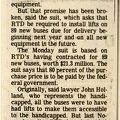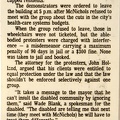Rocky Mountain News, Tues., Oct. 19, 1992 Denver, Colo.
RTD seeks to nullify handicap law
By SUE LINDSAY
News Staff
Another skirmish in the ongoing battle waged by Denver’s handicapped to gain access to the city's bus system was staged Monday in Denver District Court, with the Regional Transportation District asking the court to declare the Colorado Handicapped Act unconstitutional.
An organization of the handicapped has asked Judge Harold D. Reed to order RTD to purchase no buses that won't accommodate the handicapped and to retrofit older buses according to an agreement reached during a federal court case in 1979. The district court suit, filed in January,
was triggered by RTD’s purchase of 89 buses to be delivered in 1983 without wheelchair lifts.
RTD is trying to sidestep the provisions of that agreement, arguing that the federal regulations on which it was based no longer exist. RTD also wants the judge to declare the Colorado Handicapped Act unconstitutional
because it is overbroad and too vague to be followed.
THE JUDGE HEARD arguments by both sides Monday and said he will rule on the matter Nov. 9.
Lawrence D. Stone, an attorney representing RTD, argued that the Colorado Handicapped Act is merely an expression of the Legislature's intention of how the handicapped should be treated. Stone argued that the statute prohibits discrimination but doe§n’t require any specific
“affirmative actions” — such as buying only buses that contain wheelchair lifts.
“The Legislature intended to enact the statute simply as an encouragement for the handicapped to be brought into the mainstream of society," Stone said. “They were encouraging rather than mandating better service for the handicapped. Any efforts are voluntary, and the voluntary efforts of RTD have been substantial.”
Stone said that 50 percent of RTD buses are accessible to the handicapped during rush hour and all of them are during non-peak hours of operation.
Stone also argued that the statute, which sets maximum criminal misdemeanor penalties of up to 60 days in jail and a $100 fine, is too vague and too broad to be enforced. Stone said the act doesn’t specifically define who is included and what must be done to comply with the statute. “We must guess at its meaning,” Stone said. "lt is clear
that the act is a declaration of state policy. But is it a crime to fail to heed a policy of the state?”
Stone argued that, apart from the Colorado statute, lawyers for the handicapped have misconstrued the meaning of a stipulation signed by RTD to resolve a federal suit over the handicapped buses issue.
John Holland, an attorney representing the Atlantis Community, which filed the suit, said he and his clients understood that RTD was agreeing to purchase buses with wheelchair lifts and retrofit all buses purchased after February 1977 in compliance with federal regulations in effect at the time.
Stone said RTD merely agreed that its “intention” was to achieve accessibility at the earliest practical date. He argued that RTD never promised that all of its buses would accommodate the handicapped.
Calling the dispute “a legal and political war between the disabled and RTD," Holland said, "There was no doubt whatsoever that RTD knew for certain (that) what the plaintiffs wanted was total accessibility of buses. This has been our consistent demand everywhere. It's very simple
what the agreement means. lt means that all buses must be made wheelchair accessible.”
HOLLAND CHARGED THAT RTD was trying to weasel out of the agreement because the federal regulation in effect at the time it was reached has changed.
At the time, federal regulations made it mandatory that new buses accommodate the handicapped. The mandatory regulation was dropped in July 1981, leaving the earlier regulation in force that encourages localities to do this and provides federal funding for the wheelchair lifts.
“RTD made an agreement with us, and now RTD argues that it should not be bound by the settlement but to the law as it evolves and changes," Holland said.
Reed called the stipulation “about as unclear a stipulation as I’ve ever read in my life. I don’t know what it means yet." The judge wondered aloud whether the parties had purposely used “tortured language” to solve the immediate problem, knowing they would wind up back in court.
- Created on
- Wednesday 10 July 2013
- Posted on
- Tuesday 10 May 2016
- Tags
- affirmative action, Colorado Handicapped Act, court, criminal, John Holland, lifts on all NEW buses, rescinded regs, retrofitting, unconstitutional, voluntary compliance
- Albums
- Visits
- 2134
- Rating score
- no rate
- Rate this photo


0 comments